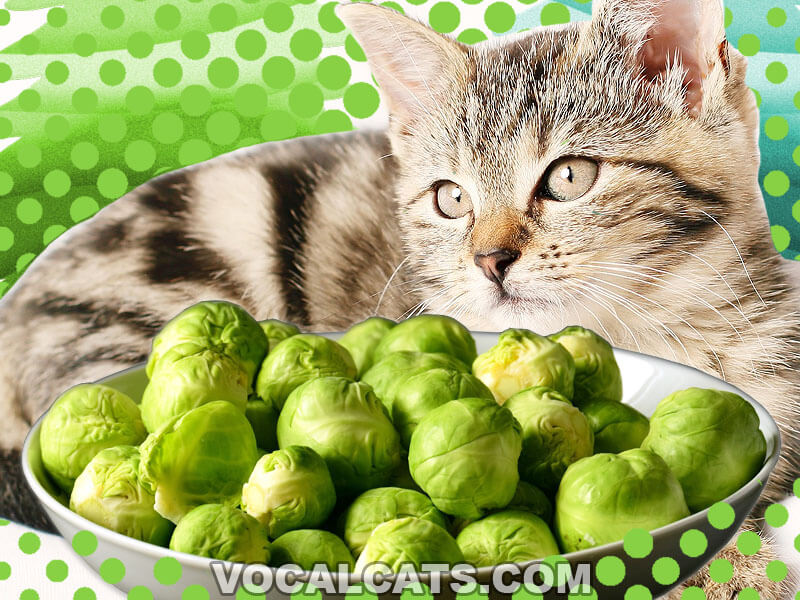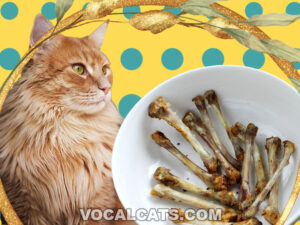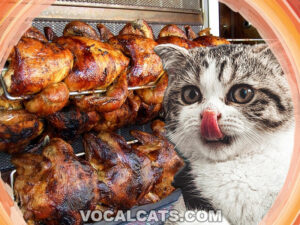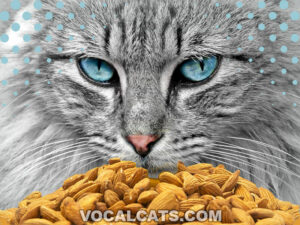Can cats eat Brussel Sprouts? Yes, cats can eat Brussel Sprouts in moderation as this cruciferous vegetable contains vitamin C and vitamin K, which are nutritionally beneficial for your feline companion. However, your fuzzy friends may not enjoy Brussel Sprouts as much because cats are generally obligate carnivores. This means they are not a fan of vegetables or grains. It’s important to note that if the Brussel Sprouts aren’t cooked properly or cut into small pieces before consumption, they can be a choking hazard.
Back when cats weren’t domesticated, they would survive in the wild by feeding solely on meat, such as rats, chickens, or tuna. As obligate carnivores, that is where they get most of their energy from. However, as cats begin to live with humans, their diet also diversified.
Cats might eat vegetables, grains, and other human food just because they see you eating them. So, if you are eating Brussel Sprouts, your fur baby might sniff one and take a bite. But can cats eat Brussels Sprouts?
In this article, we’ll answer this question in great details. Keep reading to learn more!
RECOMMENDED: Can Cats Eat Dragon Fruit?
Contents
- Can cats have Brussel Sprouts?
- Are Brussel Sprouts safe for cats?
- Are Brussel Sprouts bad for cats?
- Are Brussel Sprouts poisonous to cats?
- Health risks of giving Brussel Sprouts to cats
- Are Brussel Sprouts good for cats?
- Health benefits of Brussel Sprouts for cats
- Cats and Brussel Sprouts
- How to properly prepare Brussels Sprouts for cats
- So, Can Cats Eat Brussel Sprouts?
- Related Questions
Can cats have Brussel Sprouts?
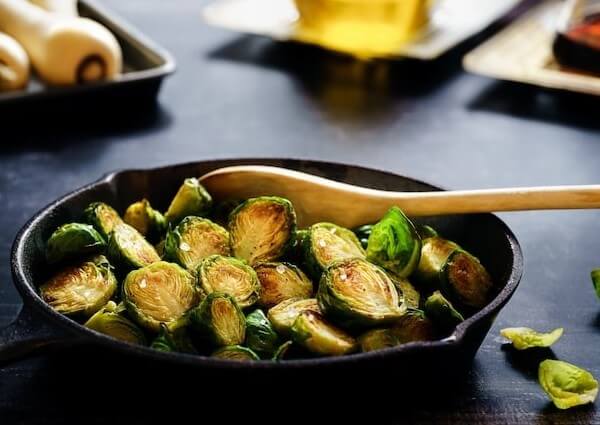
Yes, cats can have Brussel Sprouts in moderation if this cruciferous vegetable is cooked properly and cut into small pieces. Giving your kitties Brussel Sprouts in their raw form or in large chunks is not a good idea because this can be a choking hazard and is very dangerous.
While our furry friends can have Brussel Sprouts, it doesn’t mean that they should have a lot of it or consume them every day.
That’s because a cat’s digestive system isn’t made to digest a lot of vegetables. Instead their body is made to digest mainly animal protein.
To find out how Brussel Sprouts can affect your feline family member’s health (both positively and negatively), it is necessary that we learn what Brussel Sprouts are in the first place.
What are Brussel Sprouts?
Brussel Sprouts are cruciferous vegetables and are a member of the Brassica oleracea, a class of vegetables known for its edible buds. They look like miniature cabbages and are named after the place they were first cultivated: Brussels, Belgium.
The vegetable is popular for its high nutritional profile and excellent antioxidant properties.
They’re easy easy to make, and there are many ways to cook it, including steaming, boiling, roasting, frying, or even grilling.
However, our feline friends should only consume steamed or boiled Brussel Sprouts as cooked veggies are not only easier to chew but also easier on their digestive system.
You may also like: Can Cats Eat Cranberries?
Are Brussel Sprouts safe for cats?
Generally, cooked Brussel Sprouts that are chopped into small pieces are safe for cats. However, raw Brussel Sprouts are not as safe for cats.
Here are multiple reasons why:
- Brussel Sprouts are cultivated in warm, humid environments, where bacteria can easily thrive. For this reason, many foodborne illnesses have spread among people and pets alike who have consumed these sprouts. Common contaminants associated with them are Salmonella and E. coli. These contaminants cause mild to severe food poisoning that would require immediate medical attention.
- The bacteria can also cause infection in your feline companions, lasting anywhere between 7 to 21 days. You would have to give your kitties an anti-bacterial medicine, such as Amoxicillin or other medicine as recommended by your vet, to deal with skin and gastrointestinal infections.
- Consuming a lot of Brussel Sprouts can damage your cat’s red blood cells and lead to indigestion, vomiting, abdominal pain, and nausea.
Are Brussel Sprouts bad for cats?
Brussel Sprouts are not bad for cats if given in moderation and are prepared and cooked properly.
If you’re feeding your fluffy companions raw Brussel Sprouts that are also not chopped into small pieces, it can be harmful to their body and health.
Here are a few ways Brussel Sprouts can be bad for cats:
1. Raw Brussel Sprouts that are not chopped can be a choking hazard to cats
If your little fur baby is a fan of veggie for any reason, he might try to eat a Brussel Sprout raw. While Brussel Sprouts may seem small to us, these raw tiny cabbage-like vegetable is still large enough that it can be a choking hazard for your fluffy family member.
If your fuzzy friend try to consume the whole raw Brussel Sprouts, this veggie can potentially get stuck in his throat.
To prevent this, you’ll want to boil or steam the Brussel Sprouts to soften them and cut them down into small pieces before feeding them to your cat.
2. Consuming Brussel Sprouts can lead to upset stomach and diarrhea in cats
Cats can have diarrhea or dysentery in response to eating Brussel Sprouts. Vomiting is another sign that your cat’s body didn’t like what it ate.
Other symptoms can also include upset stomach, fever, and muscle spasms. In this case, do not give your feline family member any more Brussel Sprouts. We also highly recommend that you take him to see a vet and get him checked.
3. Cats can get gastrointestinal issues from consuming Brussel Sprouts
If your feline family members are consuming way too many Brussel Sprouts, they may start to experience bloating which can be uncomfortable to deal with. All cats are different so for some, just one small piece of Brussel Sprouts can cause bloating as well.
Since cats are obligate carnivores and their digestive systems are wired to digest meat, this can escalate to other gastrointestinal issues.
Additionally, many types of vegetables including Brussel Sprouts can throw their inner system out of whack and lead to other health issues.
Are Brussel Sprouts poisonous to cats?
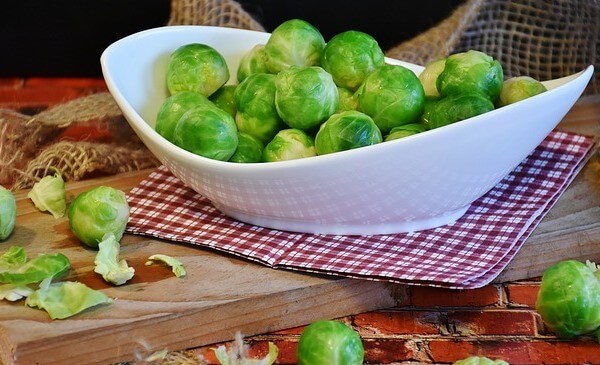
No, Brussel Sprouts are not poisonous or toxic to cats. If you do give your fuzzy friends Brussel Sprouts, be sure to chop them into small pieces and cook or steam them first so they don’t become a choking hazard.
With that said, we do want to point out that Brussel Sprouts are grown in cool and moist environments and this can result in bacterial sporulation.
In such cases, if your fluffy friend eats them raw, it can lead to bacterial infections and cause symptoms such as vomiting, diarrhea, and indigestion. Other health risks related to Brussel Sprouts are given in more detail below.
Health risks of giving Brussel Sprouts to cats
Although Brussel Sprouts are not toxic to your fuzzy kitties, moderation is always the best way to go. When cats consume these cruciferous vegetables excessively, it can result in the following health risks:
Brussel Sprouts contain goitrogens which can affect your cat’s thyroid hormone production
It’s important to point out that Brussel Sprouts are cruciferous vegetables that contain goitrogens. Goitrogens are substances that are naturally found in certain types of food including Brussel Sprouts.
This naturally occurring substances is dangerous to our little fur babies because they can decrease thyroid hormone production in the body. The thyroid gland produces thyroid hormones essential for growth, metabolism, reproductive function, and development.
When cats have low thyroid hormone levels, they may experience hypothyroidism. This is when there aren’t enough thyroid hormones to fulfill the body’s demands. It’s also true that when cats consume Brussel Sprouts, this vegetable can stop the thyroid from utilizing iodine properly.
As a result, this can lead to thyroid disease. If your cat has low levels of thyroid hormones, it is best not to give them Brussel Sprouts.
Some cats are severely allergic to plant-based foods
Some cats are allergic to plant-based foods because they don’t have the enzymes in their digestive system to properly break down the cell walls of the food.
If your four-legged friends aren’t immediately allergic to Brussel Sprouts, they can develop intolerance towards this veggie overtime when consumed regularly. Some signs of allergic reactions to look out for include vomiting, diarrhea, nausea, runny nose or eyes, irritability, difficulty breathing, dilated pupils, or itching.
Are Brussel Sprouts good for cats?
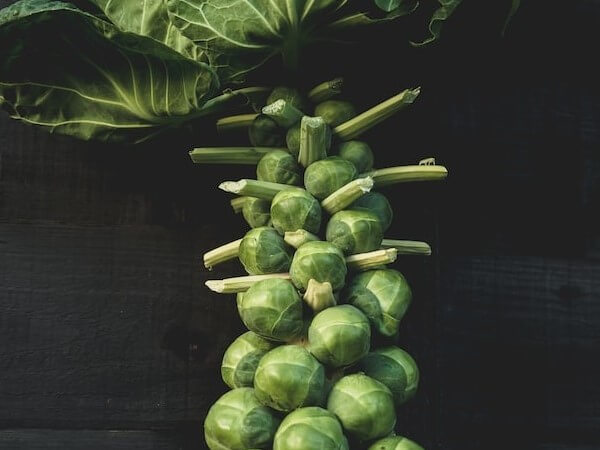
With that said, yes, Brussel Sprouts can still be good for cats if they are consumed in moderation. That’s because this cruciferous vegetable is highly nutritious and contain vitamins A, C, E, K, B1, and B6. All of these vitamins are essential for the cat’s body.
Additionally, here’s how Brussel Sprouts are good for cats:
- Aid in cell repair.
- Fight cancer.
- Contain a lot of water which keeps your feline companion hydrated.
- Fibrous which allow easy bowel movements in cats.
Below, we will discuss all these benefits in more detail below.
Health benefits of Brussel Sprouts for cats
When consumed in moderation, Brussel Sprouts can boost a tone of health benefits for your fuzzy friend. Let’s look at them in more detail below.
Brussel Sprouts contain vitamins K, B1, B6, A, C, and E
Brussel Sprouts contain many vitamins, including vitamins K, B1, B6, A, C, and E. Half a cup of Brussel Sprouts fulfills 137% of the vitamin K requirement for humans. This means this much vitamin K is more than enough for cats.
Vitamin K allows blood to clot better and helps prevent bleeding. This way, your fluffy companion can heal faster if he accidentally injures himself. Vitamin K also aids in bone growth, so cats would be less at risk of osteoarthritis as they age.
Next, Brussel Sprouts also contain Vitamin C, which is an important antioxidant involved in repairing tissues and producing skin protein like collagen.
Another antioxidant that this cruciferous veggie contains is kaempferol. Kaempferol has an anti-inflammatory effect on the body.
On the other hand, vitamin A is present in Brussel Sprouts in the form of beta-carotene and keeps your cat’s skin healthy.
Finally like vitamin C, vitamin E is also an essential antioxidant that is a fat-soluble and acts as a barrier against free radical damage.
The other two vitamins, B1 (Thiamine) and B6 (pyridoxine), helps repair nerve damage and keep the nervous system healthy. They heal symptoms like tingling and numbness.
Cats that are deficient in vitamin B1 will have Thiamine deficiency.
Some signs and symptoms of Thiamine deficiency include:
- Vomiting.
- Anorexia.
- Dilated pupils.
- Loss of vision.
- Ataxia or poor muscle control and causes clumsy movements.
- Muscle tremors.
- Seizures.
- Vestibular signs.
If your fuzzy friend has vitamin B6 deficiency, especially as a kitten, they may experience the following:
- Poor or slower growth rate or failure to grow.
- Anemia.
- Convulsion.
- Calcium oxalate crystalluria and oxalate nephrocalcinosis: when there are kidney or bladder stones in cats.
- Microcytic hypochromic anemia: A type of anemia where the circulating red blood cells (RBCs) are smaller than the usual size of RBC. Also, the RBCs have less hemoglobin than usual so there’s less of that red color.
- Emaciation: when there is loss of muscle mass in cats. You can see your fuzzy friend’s ribs, pelvis, and spine due to very little to no body fat.
If your feline family members have Thiamine deficiency and vitamin B6 deficiency, they may start to have neurological disorders. This is why it’s important to bring your fuzzy friends to see the vet regularly. During the regular vet visit, any vitamin deficiency will be detected and early prevention is key.
Brussel Sprouts can help regulates blood sugar levels in cats
Brussel Sprouts contain alpha-lipoic acid, a special antioxidant that helps lower up to 64% of animal blood sugar levels. This vegetable also contain omega-3 fatty acids which helps to reduce insulin resistance and fasting blood glucose.
Brussel Sprouts promote regular bowel movements in cats
Both soluble and insoluble fiber is present in Brussel Sprouts which helps to aid digestion in cats. Insoluble fiber softens stool and bulk it up so it can easily pass through the intestines and allow for easier bowel movements.
In addition, soluble fiber can help with gastric motility disorders, repair colon cells, and feeds nutrients to the gut microbiota.
Fiber rich Brussel Sprouts can encourage weight loss in cats
Fiber-rich diets can also help cats lose weight. When our fuzzy friend consume a moderate amount of cooked Brussel Sprouts, they will feel fuller for a longer period of time.
If your feline companion need a bit of fiber in his diet or need to lose some weight, speak with your vet to see if it’s a good idea to incorporate a moderate amount of Brussel Sprouts into his diet.
With that said, it’s important to keep in mind that cats are obligate carnivores and they actually need more animal protein in their diet than veggies. A little bit of vegetable can act as a supplement but it should not take over their primary food source.
RECOMMENDED: Can Cats Eat Celery?
Brussel Sprouts can promote hydration in cats
Brussel Sprouts contain a lot of water which promotes hydration in cats. In fact, 100 grams of Brussel Sprouts has a whopping 86 grams of water, which means your fluffy family member can stay hydrated from eating a moderate amount of Brussel Sprouts.
This is especially beneficial for cats who don’t like to drink water or who don’t have the habit of drinking water. While we would still highly recommend that cat owners encourage their feline friends to drink water throughout the day, it doesn’t hurt to feed them a little bit of Brussel Sprouts to continue to keep them hydrated.
Consuming a moderate amount of Brussel can help fight cancer in cats
Brussel Sprouts contain sulforaphane, a sulfur-based nutrient that is a powerful phytochemical known to act as a barrier against cancer. Sulforaphane helps to fight against free radicals, so your kitties’ cells remain healthy.
Apart from neutralizing toxins, sulforaphane reduces inflammation and blocks DNA mutations. This in turn prevents cancer.
We want to point out that sulforaphane is readily available in other types of cruciferous vegetables like kale, and bok choy. It’s best to steam or boil them before giving it to your fuzzy kitties.
As we can see, Brussel Sprouts are a nutrition powerhouse. Feeding your felines a moderate amount of cooked Brussel Sprouts does not hurt as this veggie is packed full of essential phytonutrients, minerals, and antioxidants.
Cats and Brussel Sprouts
Can cats eat Brussel Sprout leaves?
Yes, cats can eat cooked Brussels Sprout leaves because they are easier to eat than the vegetable itself. You can cook them with the Brussel Sprouts to soften them so it’s easier for your feline companions to consume them.
However, the Brussel Sprout leaves don’t have any essential nutrients that will benefit your fluffy friend. Also, as obligate carnivores, cats don’t need a lot of greens in their diet and can do well without them.
But cats are curious creatures and tend to try everything within reach to check if it is edible. They will gulp it down if they like it or spit it out if they don’t find it delicious. They might do the same with the Brussel Sprout leaves.
Can cats eat cooked Brussel Sprouts?
Yes, cats can eat cooked Brussel Sprouts. In fact, it is highly recommended that cat owners feed their feline family members cooked Brussel Sprouts over raw ones. This is because raw Brussel Sprouts are hard, and your cat can easily choke on them.
Furthermore, boiling or steaming the Brussel Sprouts can destroy any bacteria or pathogens in the vegetables that could harm your furry friends.
Cooked Brussel Sprouts are softer in texture, so they are easier to chew, and your cat’s digestive system won’t have a hard time breaking them down. Chop the soft sprouts into smaller pieces before giving them to your feline friend.
With that, we do want to point out that overcooking Brussel Sprouts can destroy the essential nutrients that makes this vegetable so worthwhile to consume in the first place. Try to steam the Brussel Sprouts so that the nutrients are still there and avoid overcooking them.
Also, don’t add salt or spices like onion or garlic to the cooked Brussel Sprouts because both salt and spices are harmful, if not toxic to cats. If you’re not careful and you added a lot of salt when cooking this vegetable, it can potentially cause salt poisoning in cats.
Signs and symptoms of salt poisoning in cats include the following:
- Extreme thirst.
- Excessive urination.
- Vomiting.
- Diarrhea.
- Behavioral changes.
- Internal bleeding.
- Lack of coordination.
- Lethargy.
- Loss of appetite.
- Muscle weakness.
- Seizures.
- Tremors.
- Coma.
If you suspect your fuzzy companion has sodium poisoning, we highly recommend that you call your vet right away. While salt plays a key role in maintaining fluid balance and help regulate metabolism and several organ systems in cats, too much sodium can be harmful as well.
Once at the vet, the salt poisoning will be properly diagnosed through diagnostic test to confirm that there is excess sodium in your feline friend’s blood that is causing the above symptoms.
Additionally, some may enjoy their Brussel Sprouts with a bit of garlic or onion spices. If you plan to give your kitties a little bit of cooked Brussel Sprouts, make sure the veggie is plain. Ingesting food with onion and garlic is actually very dangerous to cats because these two spices are toxic to them.
That’s because both onion and garlic contain an oxidant called n-propyl disulfide, which is very toxic to cats. Keep in mind that garlic and onion powder are more potent than fresh ones so if you use the powder form, they can cause more serious issues in cats.
Consuming garlic and onion can cause oxidative damage which causes the cat’s red blood cells to rupture. Additionally, garlic and onion can relax the cat’s heart muscles and cause the blood vessels to widen. This allows more blood to flow through the vessels and can lead to low blood pressure.
As a result, the oxygen isn’t being delivered to vital organs. In some cases, the n-propyl disulfide can also hinder blood clot.
Some of the signs and symptoms of garlic and onion poisoning include the following:
- Anemia.
- Lethargy.
- Muscle weakness.
- Loss of appetite.
- Fainting.
- Pale gums.
- Drooling.
- Vomiting.
- Diarrhea.
- Hemolytic anemia.
- Nausea.
- Abdominal pain.
- Elevated heart rate.
- Fast breathing.
- Unwilling to exercise.
Again, if you suspect your feline friends have garlic or onion poisoning, be sure to call your vet right away. This requires immediate medical attention. If the vet is not available, call the pet poison helpline at (855) 764-7661.
Can cats eat raw Brussel Sprouts?
No, cats should not eat raw Brussel Sprouts. Raw Brussel Sprouts are hard so they’re more difficult to swallow and can be a choking hazard.
Also, Brussel Sprouts are cultivated in cool and moist environments, which makes them a great harboring ground for bacteria. Therefore, there is a high chance of getting a bacterial infections if your furry friends eat these raw veggies.
Some signs and symptoms of bacterial infections in cats include vomiting, diarrhea, fever, and lethargy.
However, if your cat do prefer raw Brussel Sprouts for any reason, that’s fine too since these raw veggies can be a great source of nutrients and minerals for your cat that may otherwise diminish with cooking.
Be sure to wash the veggie thoroughly and properly. This will remove any cling-on parasites and dust particles. You’ll then want to chop the Brussel Sprouts into fine small pieces so it’s easier to eat, chew, and swallow. When buying Brussel Sprouts for your feline friend, make sure the veggie is organic so that they’re not exposed to pesticides or harmful aerosols.
To recap, it’s best to either steam or boil these veggies. If your cat prefer to eat raw Brussel Sprouts, make sure to wash them thoroughly and properly to eliminate all the parasites.
Can cats eat Brussels Sprout stalks?
No, cats should not eat Brussel Sprout stalks. That’s because Brussels Sprout stalks are a bit too tough for your fuzzy friends to chew.
For this reason, your fluffy companion may not even want to eat them.
You’re probably wondering whether cats can eat Brussels Sprout stalks because you bought the Brussel Sprouts on the stalk which keeps the sprouts fresher for a longer period of time and helps to retains their taste.
If you do choose to give your little fur babies Brussels sprout stalks, be sure to steam or cook them a bit longer until the stalk starts to soften.
Cats can eat Brussel Sprout stalks after you cook them well since it is softer and easier to eat. However, keep in mind that cooked Brussels Sprout stalks mean that the phytonutrients in them has diminish a bit.
As mentioned before, cats don’t need a lot of vegetables, leaves, or greens in their diet because, as obligate carnivores, they thrive on animal meat so there’s really no need to feed them Brussels Sprout stalks.
How to properly prepare Brussels Sprouts for cats
If you would like to diversify and add some variety to your cat’s diet, adding a moderate amount of Brussel Sprouts as a supplement can be a good idea. However, you should properly prepare the Brussels Sprouts first so that your feline friends can safely and easily consume them.
Follow the steps below to ensure the Brussels Sprouts you’re feeding your kitties are fully cooked, safe, and delicious:
- With a knife, chop the Brussel Sprouts from the stalk.
- Choose 1 or 2 fresh sprouts.
- Remove any excess leaves, stems, or stalk left on the sprouts.
- Wash the sprouts thoroughly with warm water to remove debris, dust, or any chemicals.
- Slice the sprouts into quarters so they’re small enough for your fuzzy friends to eat.
- Place the sprouts in the steamer for about 5 minutes or when the sprouts have softened.
- If you don’t have a steamer, you can boil the sprouts in a pot of hot water for 5 minutes.
- Use a fork or knife to check the softness of the sprout.
- If the fork or knife goes through the sprouts easily, turn off the heat.
- Let them cool down for a few minutes before giving them to your cat.
- Avoid adding any salt or seasoning. Plain Brussel Sprouts are the best for cats.
So, Can Cats Eat Brussel Sprouts?
Cats may not love Brussel Sprouts as much as we do, but they surely will have the curiosity to nibble on one. This might have you wondering whether cats can eat Brussel Sprouts or not.
Rest assured that this cruciferous vegetable isn’t toxic to your feline friend as long as you give them one or two Brussel Sprouts a day and chop them up in small pieces before cooking them so they remain soft and easy to eat.
While cats are carnivores animal, it doesn’t hurt to supplement their diet with a moderate amount of Brussel Sprouts which are nutritious and can benefit your feline companion’s health. As always, we highly advised that you consult with your cat’s veterinarian as they know your fluffy companion the best and will know what he needs.
Related Questions
Yes, Brussel Sprouts are ok for cats to eat as long as they are prepared properly (wash thoroughly with warm water to remove dirt, debris, and chemicals), cooked fully, and chopped into small pieces. Avoid feeding your feline friends raw Brussel Sprouts because this will make it difficult for cats to chew or Brussel Sprouts whole because this can be a choking hazard.
No, sprouts are not toxic to cats if they’re prepared properly, fully cooked, are plain without any added salt or seasoning, and are consumed in moderation. Properly preparing the Brussels Sprouts mean washing them with warm water to get rid of any parasites, dirt, or debris. The best way to cook this vegetable is to steam them as this cooking method helps retain the vitamins and minerals found in this veggie. Also, be sure to chop them into small pieces so your cat won’t choke on them.
Cats can eat peas, chopped carrots, zucchini, spinach, green beans, lettuce, pumpkin, Brussel Sprouts, winter squash, and broccoli florets.
No, Brussel Sprouts are not toxic to animals as long as they are given in moderation and prepared properly before consumption. By preparing the Brussel Sprouts properly, we mean that this vegetable should be wash thoroughly with warm water to get rid of dirt, debris, and any chemicals from the farm and it should be chopped into small pieces to avoid becoming a choking hazard. Moderation is key as consuming too much Brussel Sprouts, especially in cats, can lead to upset stomach, diarrhea, and even vomiting.
No, cats should not eat Brussel Sprouts that are cooked with Sammy Curry’s. Only feed your fuzzy friend plain Brussel Sprouts. Any and all types of spices are unnecessary for cats and may even cause poisoning.
Onions, garlic, scallions, chives, shallots, leeks, or any of the vegetables in the Allium family are not safe for cats because they damage their red blood cells and cause gastrointestinal problems. Additionally, both eggplants and tomatoes are unsafe for cats because they contain a chemical called solanine which can cause gastrointestinal distress, loss of appetite, and aggressive behavior in cats.
DISCLAIMER: THIS WEBSITE DOES NOT PROVIDE MEDICAL ADVICE
The information, including but not limited to, text, graphics, images and other material contained on this website are for informational purposes only. No material on this site is intended to be a substitute for professional veterinary advice, diagnosis, or treatment. Always seek the advice of your veterinarian or other qualified health care provider with any questions you may have regarding dietary needs.
Resources:
https://www.hsph.harvard.edu/nutritionsource/food-features/brussels-sprouts/
https://nap.nationalacademies.org/resource/10668/cat_nutrition_final.pdf
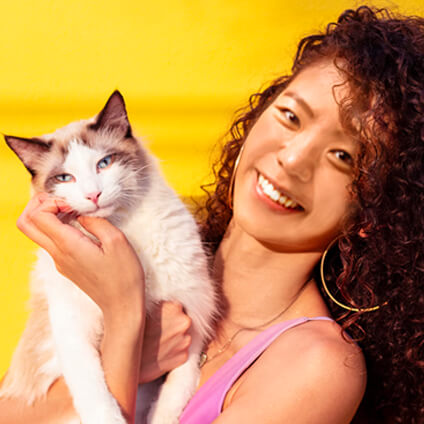
With over five years of specialized experience as an animal writer, my expertise lies in cat nutrition, health, behavior, grooming, and training. I am dedicated to delivering helpful and informative content that caters to the well-being of our feline friends. My primary goal is to empower pet owners with knowledge and ensure our feline companions thrive in health and happiness. In my free time, I love volunteering at local cat rescue centers.
